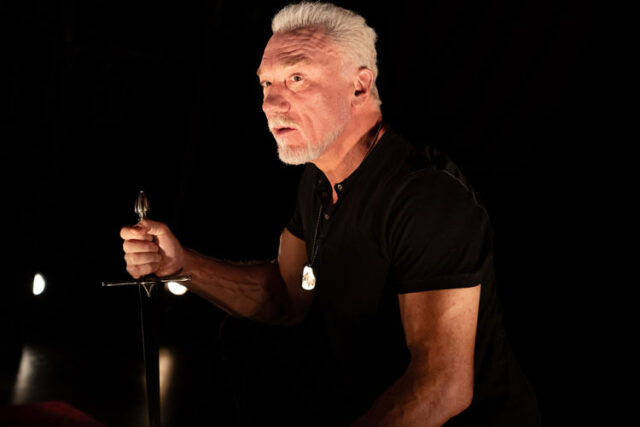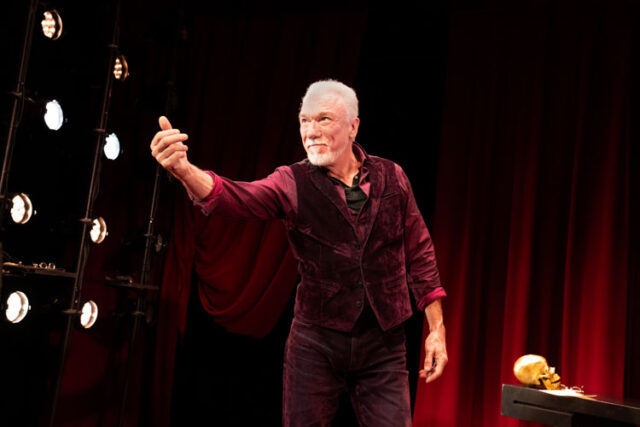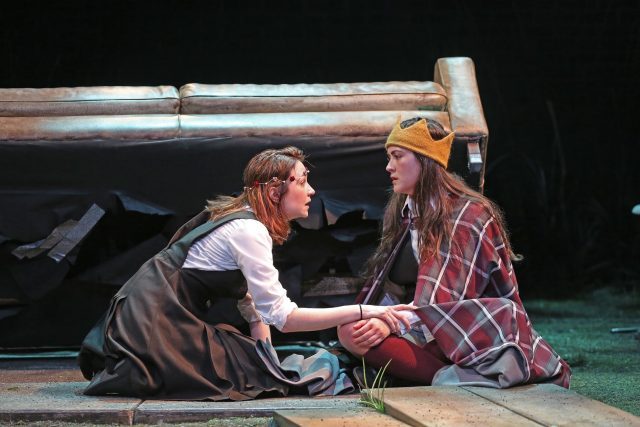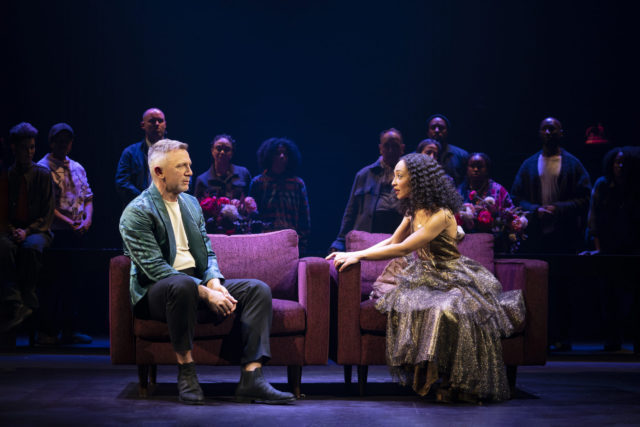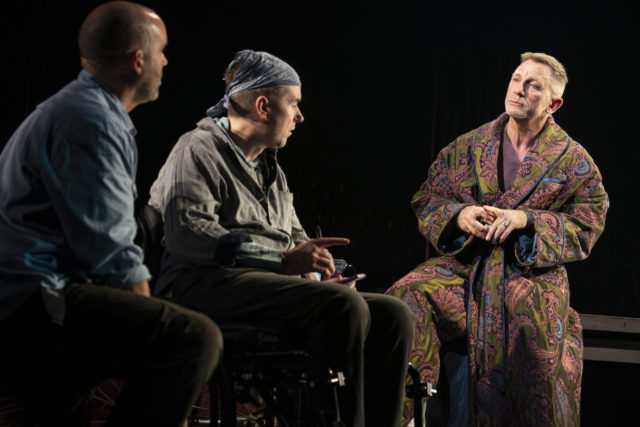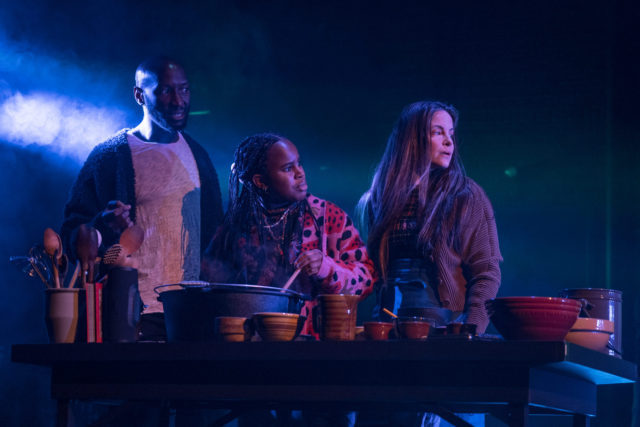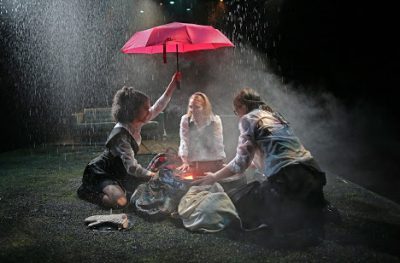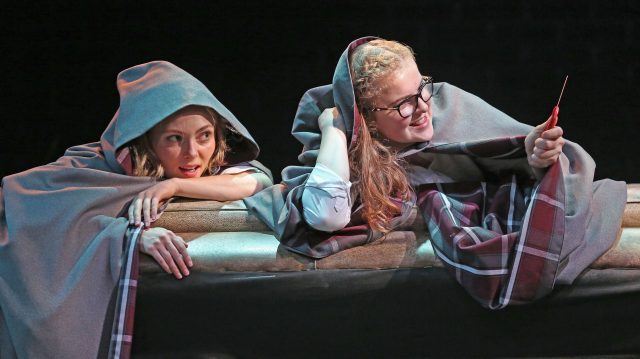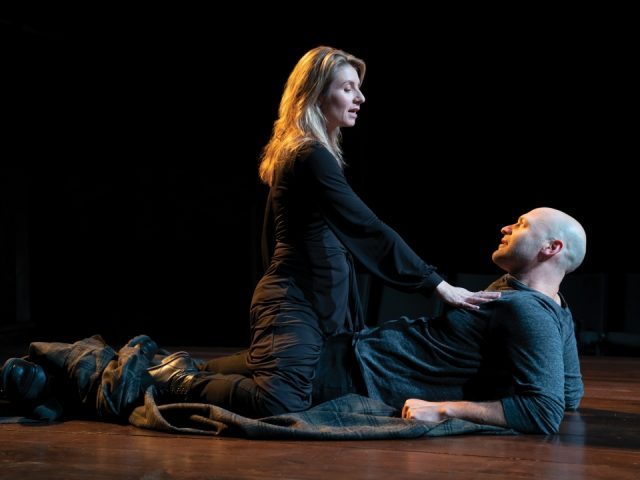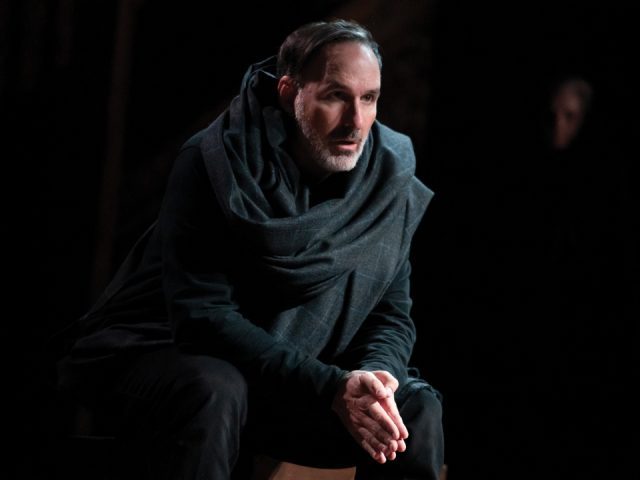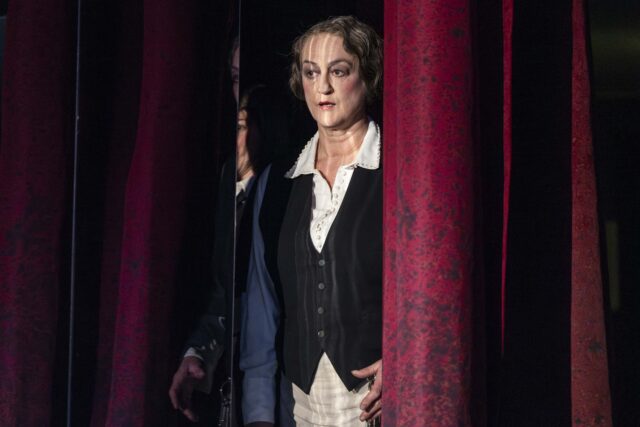
Liz Kettle portrays a mysterious narrator guiding audiences through a unique version of the Scottish play at TFNA’s Polonsky Shakespeare Center (photo by Ellie Kurtz)
MACBETH (AN UNDOING)
Theatre for a New Audience, Polonsky Shakespeare Center
262 Ashland Pl. between Lafayette Ave. & Fulton St.
Tuesday – Sunday through May 4, $97-$132
www.tfana.org
Zinnie Harris pulls a thread from the Scottish play to unravel and reconstruct it in her unique and appealing revamp, Macbeth (an undoing).
The tinkering begins with the curtain; I can’t remember the last time I saw a curtain used at Theatre for a New Audience’s Polonsky Shakespeare Center. Here it’s like a tease, promising something different, and that’s just what writer-director Harris and the talented ensemble deliver.
The play, arguably William Shakespeare’s most malleable, usually begins with the three witches prognosticating Macbeth’s future, but Harris kicks things off with a theater hand named Carlin (Liz Kettle) telling a knock-knock joke. She knows precisely what the audience is there for. “Misery seekers — here they come. Eyes all nasty and randy for gore. You recognise yourself? Mouths open, tongues out. You’re all the same,” she says. “Death is what you want — blood, despair, the fall of man? It’ll be as you last saw it — but no matter, things fare better when they are played and played again. Never an end to your asking for more. And — what more do we have for your ghouls? Bare boards. Nothing much. If you’re looking for pyrotechnics, you’ll be disappointed — no thunder to speak of, no heath — no lightning, no rain — what will you do? No matter, you say — blood cold and unmoving — just give us the play! The play the play, of course we’re here to do the play.”
Macbeth (an undoing) is a stripped-down version of the tale of power and ambition. The Royal Lyceum Theatre Edinburgh production features a cast of ten actors turning the familiar story upside down and inside out; characters are excised, motivations flipped, and roles reversed on a makeshift set that is constantly being taken down and rebuilt. The central figure is a revamped Lady Macbeth (Nicole Cooper), who takes the reins early and never gives them up.
The basics of the narrative are there: A trio of witches (Emmanuella Cole, Star Penders, Kettle) tells war hero Macbeth (Adam Best) and his right-hand man, Banquo (James Robinson), that the former will become thane of Cawdor and then king and that the latter will be the father of kings. After King Duncan (Marc Mackinnon) indeed names him the new thane of Cawdor, Macbeth and his wife conspire to murder the ruler, who has come to their home to celebrate and spend the night. Macbeth’s rise leaves a trail of blood behind, along with a guilty conscience that overwhelms him.
If that sounds like the traditional Macbeth you’ve seen perhaps numerous times, well, Harris throws a lot of that tradition out the window and reimagines the narrative from a feminist angle, mostly with gritty success.
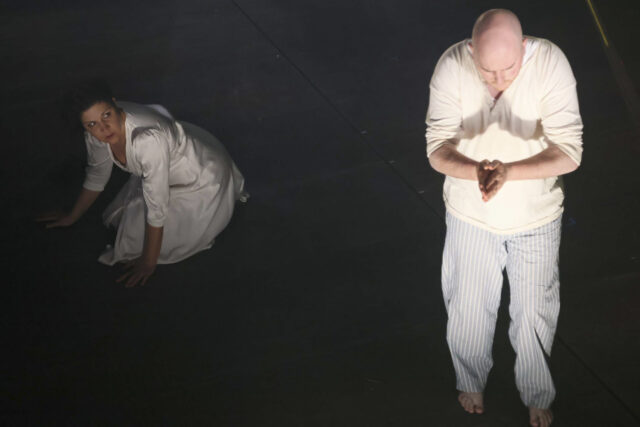
Lady Macbeth (Nicole Cooper) and her husband search for their sanity in Macbeth (an undoing) (photo by Hollis King)
The bloody soldier (Taqi Nazeer) who announces at the beginning, “Doubtful it stood,” has trouble getting the words out, so Carlin spurs him on. When he says they won the war, she asks the badly wounded man, “Aye, did you win?”
Macbeth is not the heroic figure we are used to seeing at the start of the play; instead, he’s indecisive and tentative, like a grounded bird. Upon learning of his possible future from the witches, he proclaims to Banquo, “I’m the thane of fucking Cawdor.” When Lady Macbeth removes a ladybird (the British term for a ladybug) from his sleeve, declaring it’s good luck, he sees it as “another strange soliciting”; a raven — a bird of prey — shrieks, and Macbeth wonders what he is going to wear for dinner. At the end of the scene, Carlin picks up the ladybird and puts it in a box, saving it to perhaps perform evil deeds later.
Carlin then becomes a bent-over servant who says a line that is usually spoken by the nobleman Lennox: “And the obscure bird clamoured outside the window the livelong night.” She adds, “And yet downstairs a party. Duncan couldn’t hear the screams of the birds over the sound of his own delight.” Duncan might not be able to hear the birds, but we can, courtesy of sound designer Pippa Murphy.
Lady Macduff (Cole) is given more prominence in Harris’s adaptation; she is pregnant and carrying on a torrid affair with Banquo. Her husband (Thierry Mabonga) is a cuckolded buffoon who is always in a hurry. When he tells Malcolm to pick up branches and Malcolm asks where they are, Macduff replies, “On the trees, you idiot. Where branches grow. Though god knows how you grew on the royal one.”
Lennox (Nazeer) and Ross (Laurie Scott), a messenger, seem to have emerged from a contemporary cocktail reception. At the celebration for King Duncan, a bird flies inside. “I don’t like birds,” Malcolm complains. “No matter – I’ll deal with it,” the determined Lady Macbeth says. “It makes a racket,” Lennox adds. “Perhaps Cawdor’s spirit coming to piss on the party — !” Ross concludes. While Shakespeare has Ross and Lady Macduff cousins, Harris changes it to Lady Macduff and Lady Macbeth. “Cousins, as you always remind me, the root and tree of our family are not as close as sisters,” Lady Macbeth opines.
The biggest change occurs in the second act, when Lady Macbeth essentially swaps roles with Macbeth, becoming the central figure, even taking over one of Macbeth’s most famous soliloquies. In this version, Lady Macbeth stares madness in the face as she recounts her numerous failed pregnancies and admits feeling confused about one of the play’s new fragments about her character. She asks the witches, “But even if I was given to remorse and grief, what would she fall down upon? For taking the options that a man would? For living in a life and place that was so brutal that power by any other means was impossible.”
Moments later, Macbeth wonders, “How comes it that all our children die?” Lady Macbeth laughs, looks at him, and responds, “So I am reduced to my infertility after all. Even by you. I thought I loved you.” She’s also reduced to her infertility by Harris, who teeters on the edge of undoing one of her major themes by blaming Lady Macbeth’s impending insanity on her inability to become a mother.
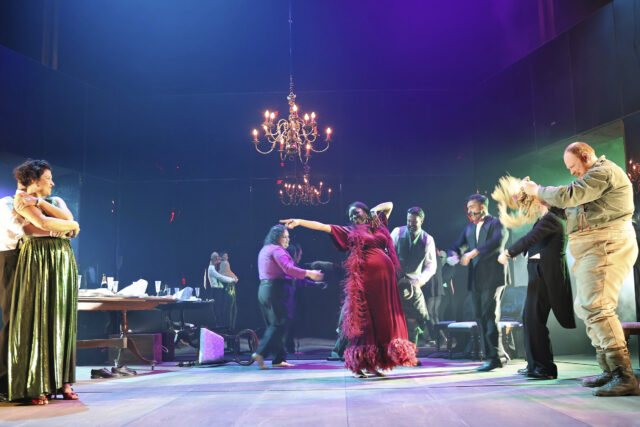
The party is just about over in feminist reimagining of Macbeth (photo by Gerry Goodstein)
Kettle (Dracula: Mina’s Reckoning, Attempts on Her Life) is a splendid host for the 155-minute evening (with intermission), smoothly transitioning among her three roles; I would have loved to see more of her as Carlin, our guide through a sometimes confusing reinterpretation by Harris (The Scent of Roses, The Duchess [of Malfi]) that is often exhilarating and occasionally awkward as she toys with classical tropes. Cooper’s (Coriolanus, Medea) Lady Macbeth is bold and strong, not about to play second fiddle to Best’s (Cyrano De Bergerac, The Beauty Queen of Leenane) duly tentative and jittery Macbeth. Mabonga (Everything Under the Sun, Last Dream on Earth) redefines Lady Macduff, while Penders (Aganeza Scrooge, SCOTS) provides comic relief while engenders sympathy as the not-ready-for-prime-time Malcolm.
Tom Piper’s fog-drenched minimalist set, with metal structures, wooden panels, and various pieces of furniture wheeled on and off, alternates between the present day and the distant past — yes, that’s a telephone and an electric lamp on Lady Macduff’s desk — and shabby-chic fun-house mirrors shift characters’ physical dimensions at certain angles. Alex Berry’s costumes maintain the dichotomy, highlighted by Lady Macduff’s dazzling red dress and a series of magically bloodstained white frocks. Oğuz Kaplangi provides atmospheric interstitial music.
Late in the show, Carlin says to Lady Macbeth, “Knock knock knock, open locks. And perhaps we do meet one more time. In a place where we talk about women helping each other. Of seeing each other as we are.” Lady Macbeth asks, “Why do you do this?” Carlin answers, “Because you always got us wrong.” Harris goes a long way to setting things right, although there are slip-ups.
The play concludes with another new fragment, this one incorporating a snippet of a famous quote from A Midsummer Night’s Dream, as Harris wonders whether her new version has offended anyone, then thinks better of it as birdsong floats in the air. It’s a lovely ending to a tragic story.
[Mark Rifkin is a Brooklyn-born, Manhattan-based writer and editor; you can follow him on Substack here.]
